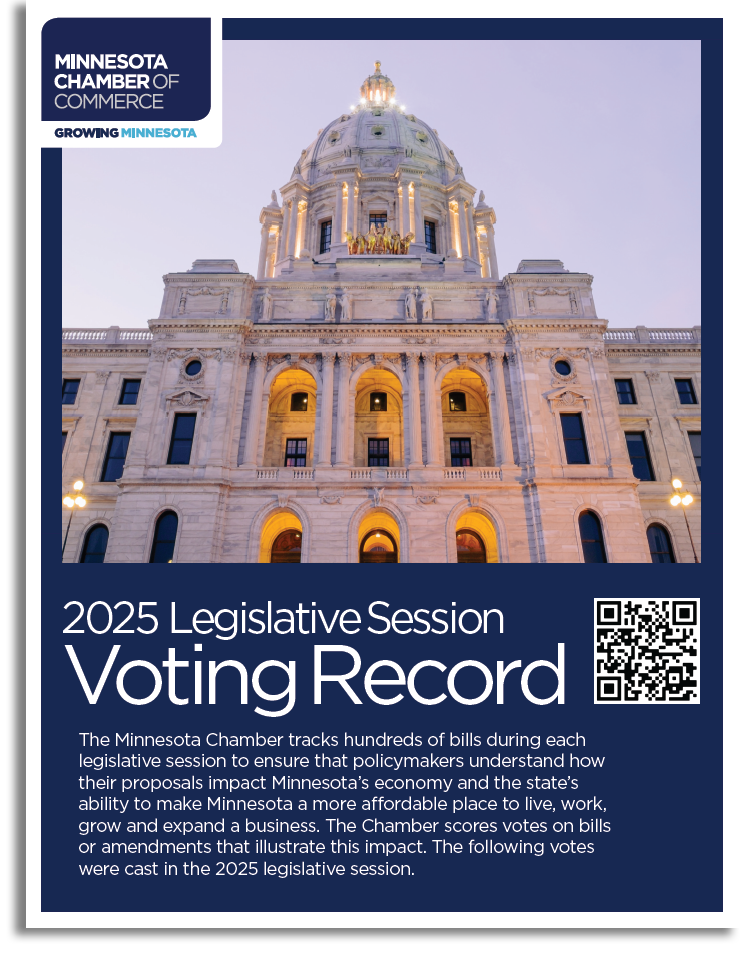Key Issues
At the Minnesota Chamber of Commerce, our policy agenda comes directly from our members, the businesses who drive the state’s economy.
Through policy committees, surveys, and our Statewide Policy Tour, members raise the challenges they face every day including taxes, workforce, mandates, health care, transportation, energy and more. Our policy committees draft recommendations, our Board of Directors approves them and our advocacy team works at the Capitol to advance them every day in and out of the legislative session.
2026 session priorities
Minnesota enjoys great strengths as state: a highly developed, innovative and diverse economy, a skilled and reliable workforce along with best-in-class class health care, quality infrastructure and enviable natural resources that all contribute to and enhance our quality of life. A growing, successful private sector economy funds and supports this high quality of life and the programs and services many Minnesotans rely on.
The state’s economy is capable of strong and sustained growth. But costs are too high, demographics are working against us, and a sense of urgency and vision for the state’s economic future need to be articulated and agreed upon.
TAXES – Improve competitiveness
Conforming to pro-growth tax policies contained within the 2025 federal tax bill, particularly bonus depreciation, Section 179 expensing and research and experimentation expensing. Adopting these policies will encourage investment and competitiveness. Failure to conform risks further compromising our position in the competitive landscape of tax policy among the states.
WORKPLACE MANDATES – Employer-focused flexibility
Implementing and making needed adjustments to the state’s Paid Family and Medical Leave mandate. The Legislature must address operational challenges for both employers and employees to ensure that the program is functional, cost controlled and responsive to workplace dynamics. The potential for fraud must be closely monitored and eliminated.
FISCAL RESPONSIBILITY – Ensuring accountability
Every dollar lost to fraud is a dollar unavailable for critical services and economic growth. Strong oversight, transparency and accountability are essential to maintaining public trust. This session should focus on accountability measures that protect taxpayers and reinforce confidence in government spending.
ENVIRONMENT – Balance regulations with protections
Good progress was made last session on improving Minnesota’s complex environmental regulatory system. The Minnesota Chamber Foundation produced a report that documented the process for acquiring air, land and water permits in Minnesota takes too long, costs too much and is too uncertain for private sector investment, which in turn drives economic growth to neighboring states or states with similar economies. Additionally, arbitrary bans and burdensome reporting requirements on products with little to no impact on human health or the environment drive commerce outside of Minnesota.
REDUCING COSTS – Improve affordability for employers and families
State policies can significantly increase costs for energy, health care and housing which directly impact employers’ ability to provide goods and services at competitive prices and employees’ ability to afford their lives. Policymakers must prioritize reducing costs and improving affordability over subsidies.
Explore key issue areas
Download the 2025 Legislative Voting Record
The Minnesota Chamber tracks hundreds of bills during each legislative session to ensure that policymakers understand how their proposals impact Minnesota’s economy and the state’s ability to make Minnesota a more affordable place to live, work, grow and expand a business. The Chamber scores votes on bills or amendments that illustrate this impact. The following votes were cast in the 2025 legislative session.







